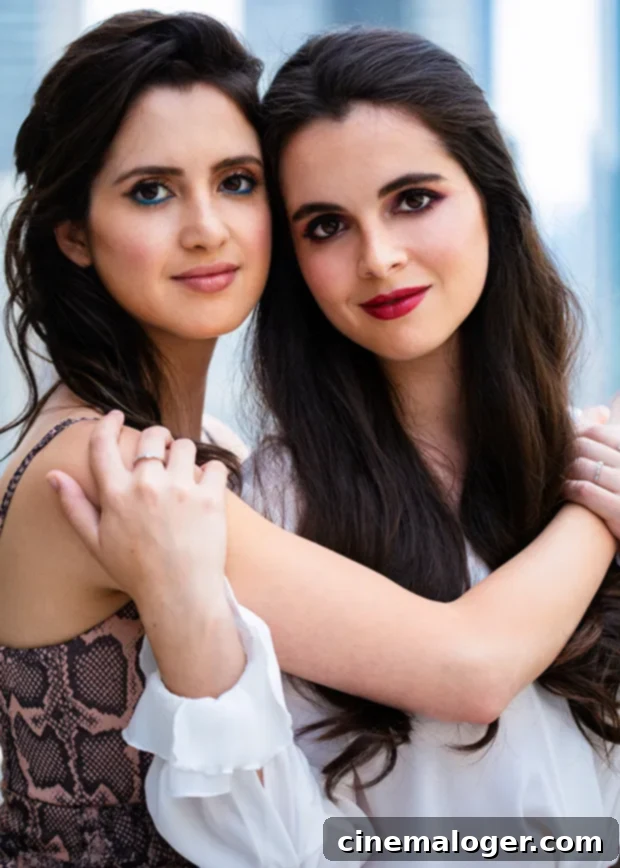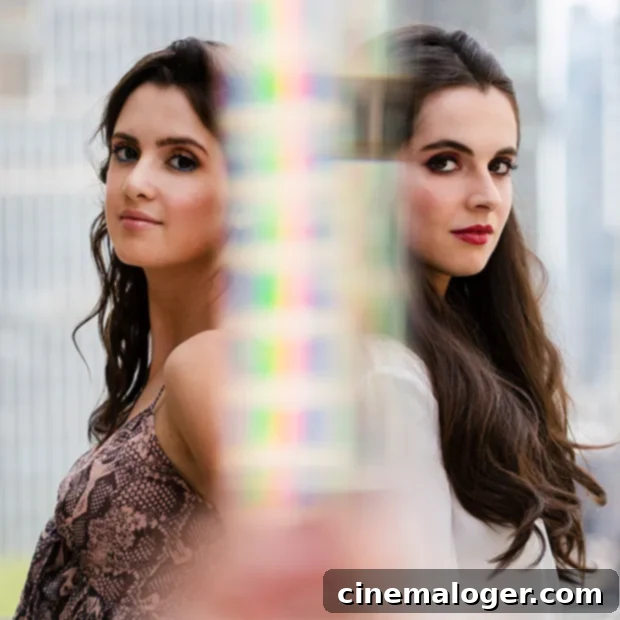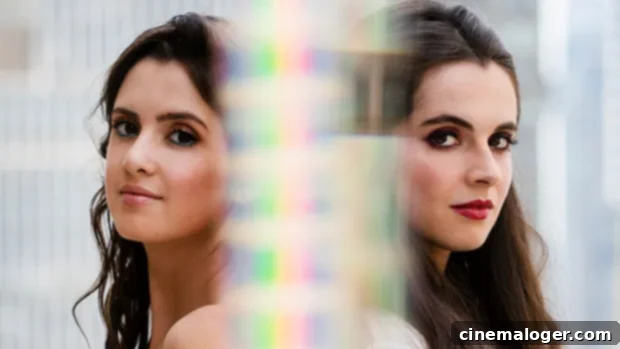Saving Zoë: Laura & Vanessa Marano on Transforming Grief, Sisterhood, and Digital Exploitation into a Powerful Cinematic Debut
Sisters Laura and Vanessa Marano embarked on a profound cinematic journey, transforming Alyson Noël’s 2007 young adult novel, Saving Zoë, into their producing debut. Over a decade after first reading the haunting story, the acting duo, alongside their mother Ellen, recognized a deep, and increasingly relevant, message within its pages. What began as an exploration of sisterly bonds and profound loss evolved into a crucial commentary on the pervasive issue of online sexual exploitation, a topic they initially knew little about but became passionate advocates for through the film’s production.
Vanessa Marano elaborates on their learning curve: “We weren’t super educated on the issue, but while working on this movie, we ended up learning so much about online sexual exploitation. It’s this idea where online videos or pictures taken unwillingly of people in maybe compromising positions or situations are then used against them and put out there without their consent or knowledge. There are so many different faces to online sexual exploitation, and obviously, our character’s story is a fictionalized one, it doesn’t change the fact that it is real and it does happen.” This realization propelled the Maranos to ensure their film not only entertained but also enlightened and empowered its audience.
Understanding the global prevalence of sexual exploitation against women and girls, the Marano sisters partnered with Equality Now. This esteemed organization is dedicated to achieving “legal and systemic change that addresses violence and discrimination against women and girls around the world.” Through this collaboration, Laura and Vanessa have hosted screenings of Saving Zoë for survivors of sexual exploitation and engaged in Q&A sessions with fans, fostering vital discussions around this complex issue. Their commitment highlights the film’s role as more than just entertainment, but as a platform for social change and awareness.
In Saving Zoë, Laura Marano stars as Echo, a high school student grappling with the horrific grief following the tragic murder of her older sister, Zoë (played by Vanessa Marano). The film masterfully delves into the harrowing emotional landscape of losing a loved one, while simultaneously following Echo’s unsettling journey of discovery. As she uncovers Zoë’s old diary, Echo is drawn into the enigmatic and darker aspects of her late sister’s life, revealing secrets that challenge everything she thought she knew about Zoë.
The Unsettling Timeliness of Saving Zoë in the Digital Age
Despite being based on a novel written over a decade ago, Laura and Vanessa Marano consistently emphasize that Saving Zoë feels more relevant today than ever before. This striking observation underscores the film’s powerful resonance with contemporary issues, particularly in our increasingly digital world. Laura notes, “It really is more relevant than ever, which has been so striking on this journey. I think it’s because we live in this digital age, and so many things in the book played a huge part in our characters’ lives online, which is even more relevant now than it was in 2007.”
She further explains that while the original book touched upon early online platforms like MySpace and the use of VHS tapes, today’s landscape of ubiquitous internet access, social media, and instant sharing amplifies the film’s core themes. The decade-long journey to bring Saving Zoë to the screen, from optioning the book to finalizing the script and production, coincidentally aligned with the exponential growth of online interactions, making its message critically urgent. “It took ten years to get a script done and to make this movie,” Laura reflects, “but we’re almost so grateful because it is far more relevant today than we could have ever imagined it would be.”
Vanessa Marano echoes this sentiment, elaborating on the dark underbelly of our hyper-connected society. She highlights that their partnership with Equality Now deepened their understanding of online sexual exploitation, revealing its insidious nature. “What people don’t realize is that online sexual exploitation is a form of trafficking that is happening daily,” Vanessa states. “It has arguably made a variety of different things, such as child pornography, easier to access than it ever was before. And because of that, it’s happening more frequently than it ever was before, but it doesn’t happen necessarily in the way that we’d all expect it to. This issue, pertaining to the internet, is a lot more insidious and frequent.” A particularly chilling aspect she notes is that victims often become entangled without realizing the severity of their situation, unknowingly placing trust in individuals who ultimately betray them.
From Initial Connection to Deeper Realization: Unpacking the Story’s True Weight
When the Marano sisters first read Alyson Noël’s novel in 2007, their connection to Saving Zoë was deeply personal, rooted in its portrayal of sisterhood, grief, and the formative experiences of young girls. Vanessa recalls, “When we read the book, we connected so much to the story about sisters, grief and in some ways to the story of what happens to you as a young girl. I think the emotions that Echo and Zoë feel are emotions that we felt, that friends of ours have felt, and I think certain situations were identical to things we’ve gone through.”
However, it was during the rigorous process of adapting the book into a film, and especially through their collaboration with Equality Now, that the full, horrifying scope of the underlying issue of online exploitation became unequivocally clear. Vanessa describes this delayed realization: “That’s even more telling, too, that the issue was almost in the background to a certain degree. It was second nature in a weird way and that’s what I think is horrifying. We don’t realize how frequent this happens, we don’t realize how small the situation is and how quickly it can get out of control. It wasn’t until making the film and partnering with Equality Now that we were like, ‘This is such a big issue that is happening so often and we need to really discuss this.'”
Laura further articulates the initial impact of the novel, emphasizing its dark yet subtly impactful nature. “It was definitely a dark book, but it’s interesting because it has a lot of aspects about grief and really the heart — is grief, not a love story between two sisters,” she explains. The sinister elements of Zoë’s past, detailing her unwitting involvement in online exploitation, gradually unravel as the reader progresses. “When you start reading about Zoë’s story and her dark past, it sneaks up on you. You finish the book feeling haunted. You finish the book knowing this is an issue, but not really knowing much about it.” This transformative journey from a vague awareness to a profound understanding of the issue’s real-world implications became a driving force behind their commitment to the film.


Challenging Industry Perceptions: Telling a Dark Story to Young Fans
With a significant following among young adults and teens, the decision to produce a film as dark and heavy as Saving Zoë was not without its challenges. The Marano sisters faced resistance from within the industry, where some argued that their target audience preferred “pretty and fluffy” content rather than gritty realities. Vanessa candidly shared, “We found that with producing the film and trying to get it made, a lot of people said, ‘It’s very dark. It’s not light and fluffy like teen girls and young adult women want, they just want things to be like pretty and fluffy,’ and we were offended by that.”
Laura vehemently disagreed with this simplistic view of young female audiences. “Right, we said, ‘No way.’ I firmly believe that young women, especially, are intelligent and strong and want to talk about things that are real and that are affecting us all.” Their steadfast belief in the maturity and intelligence of their fanbase fueled their determination to bring this important, albeit difficult, narrative to the screen. They understood that ignoring such vital topics would only perpetuate the problems they sought to expose.
The sisters recognized that silence breeds ignorance, and ignorance allows harmful issues to persist. For them, Saving Zoë represents a powerful tool for education and open dialogue. Laura affirmed this goal: “Yes, and that’s our goal with this movie. Let’s start a conversation so no one feels that they have to suffer in silence.” By daring to tell a darker, more realistic story, Laura and Vanessa Marano aimed to empower their young audience, equipping them with awareness and encouraging them to speak out against exploitation and injustice.
The Producing Journey: Overcoming Hurdles and Bridging Generations
Beyond the challenging subject matter, Laura and Vanessa took on the formidable task of producing Saving Zoë, a role that saw them involved in every step from optioning the book to overseeing the final cut. This hands-on approach, while immensely rewarding, presented its own unique set of obstacles, particularly as young, first-time female producers in Hollywood. Laura reflects on the timing of their production: “We filmed this movie before the Me Too movement, before the Time’s Up movement, and so it does feel, even in that way, like such a rewarding experience.”
Despite filming in early summer 2017, an era when female empowerment was emerging but not yet as globally resonant as it is today, they encountered skepticism. “I think we did have to fight a little harder, though, because we weren’t taken seriously at times because we were young girls and first time producers,” Laura admits. Yet, they persevered, aided by a “helpful and wonderful” crew that made the experience ultimately beautiful and fulfilling.
Their producing efforts were a family affair, as they collaborated with their mother, who brought her own extensive experience in the industry to the table. This collaboration provided a fascinating lens through which to examine gender dynamics in Hollywood. Vanessa notes, “It’s really interesting because we produced the film with our mom, and our mother grew up in this industry. She’s been in this industry since she was 20 something and so she had completely different experiences than my sister and I have had.”
Bringing three distinct generations and experiences to the producing helm highlighted a universal truth: “It was really the first time that we all three got to talk about our different perspectives on that, and bridge a generational gap,” Vanessa explains. “No matter your age or experience, coming into a position of power as a female you are treated differently.” They leveraged their collective wisdom and varied insights to navigate the complexities of production, ultimately striving to create the best possible product. This intergenerational collaboration underscored their shared commitment to the project and its vital message.
Sisterly Synergy and the Catharsis of Portraying Grief
For Laura and Vanessa Marano, collaborating on Saving Zoë was a dream realized. From the moment they read the novel, the narrative of two sisters resonated deeply with their own bond. Laura confirms, “It was always the dream from the beginning. It’s about two sisters, and we read it and we were like, ‘We’re two sisters!'” Having not worked together for a significant period, this project offered a unique opportunity to combine their individual talents and collective strength.
Vanessa emphasizes the power of their joint effort: “I think there was something really cool about us having our own individual careers as performers, and being able to, our first time producing, combine our fan bases.” This family project, undertaken with their mother, forged a stronger unit, allowing them to tackle the film’s profound themes with shared conviction and support. “Especially since this is a family project we did with our mom, we feel so much stronger together.”
Portraying the devastating grief of losing a sister, particularly for Laura as Echo, demanded an immense emotional investment. Laura describes the challenging balancing act between acting and producing: “I think there was a level of we had to, right? Sometimes when you just have to, because we were wearing our producer hat as well, I didn’t have time to totally understand and comprehend all the kind of feelings and emotions I was having enter my body.” While her acting process involved deeply immersing herself in the character’s headspace, she had to quickly transition back to her producer role, making it “a challenging situation that was absolutely necessary.”
Surprisingly, this intense emotional work proved to be cathartic for both sisters. Vanessa explains, “Part of another reason we were attracted to Saving Zoë was ultimately because it’s a story about grief. We’ve experienced a fair amount of loss in our lives, and particularly Saving Zoë came at a time when there was a lot of grief back to back to back.” She views grief as an unavoidable, albeit difficult, aspect of life. “As difficult as grief is, it is a part of life and I think there was something about making a project about how difficult that process is and how all over the place that process is, that was cathartic.” Through the art of storytelling, they found a way to process and share universal human experiences of loss and healing.
Upholding the Author’s Vision: A Collaborative Adaptation
Maintaining fidelity to Alyson Noël’s original novel was paramount for the Marano sisters throughout the adaptation process. They understood the delicate balance of translating a beloved book to the screen while honoring its core essence. Laura confirms their commitment: “It was really important. We actually worked with the author every step of the way.”
Vanessa details their close collaboration with Noël, underscoring the author’s integral role and invaluable approval. “We sent Alyson the first draft of the script, we showed her first cuts of the film — her blessing was very, very important to us. She’s so wonderful to work with and made us feel so confident in our abilities.” They recognized that film and literature are distinct forms of storytelling, necessitating thoughtful adaptations. “Obviously a film is always going to be different than a book, it’s a different type of storytelling, so when transforming a book to screen you really have to isolate what are the important points that have to be told in order for the story to translate on the screen,” Vanessa clarifies. They meticulously identified and preserved key moments and narrative threads that were crucial to the story’s integrity.
The ultimate validation came from Noël herself. “We were very conscious of that through the process, but overall there are very specific moments that stayed in that we thought were so important to the story,” Vanessa concludes. “The fact that she feels that we did right by her is the best feeling in the entire world.” This unwavering respect for the source material ensured that Saving Zoë not only offered a compelling cinematic experience but also remained true to the powerful narrative that first captivated the Marano sisters over a decade ago.
Saving Zoë is now available On Demand, as well as on iTunes, Amazon, Spectrum, DirecTV, and in select theaters across the country, inviting audiences to engage with its timely and impactful story.
